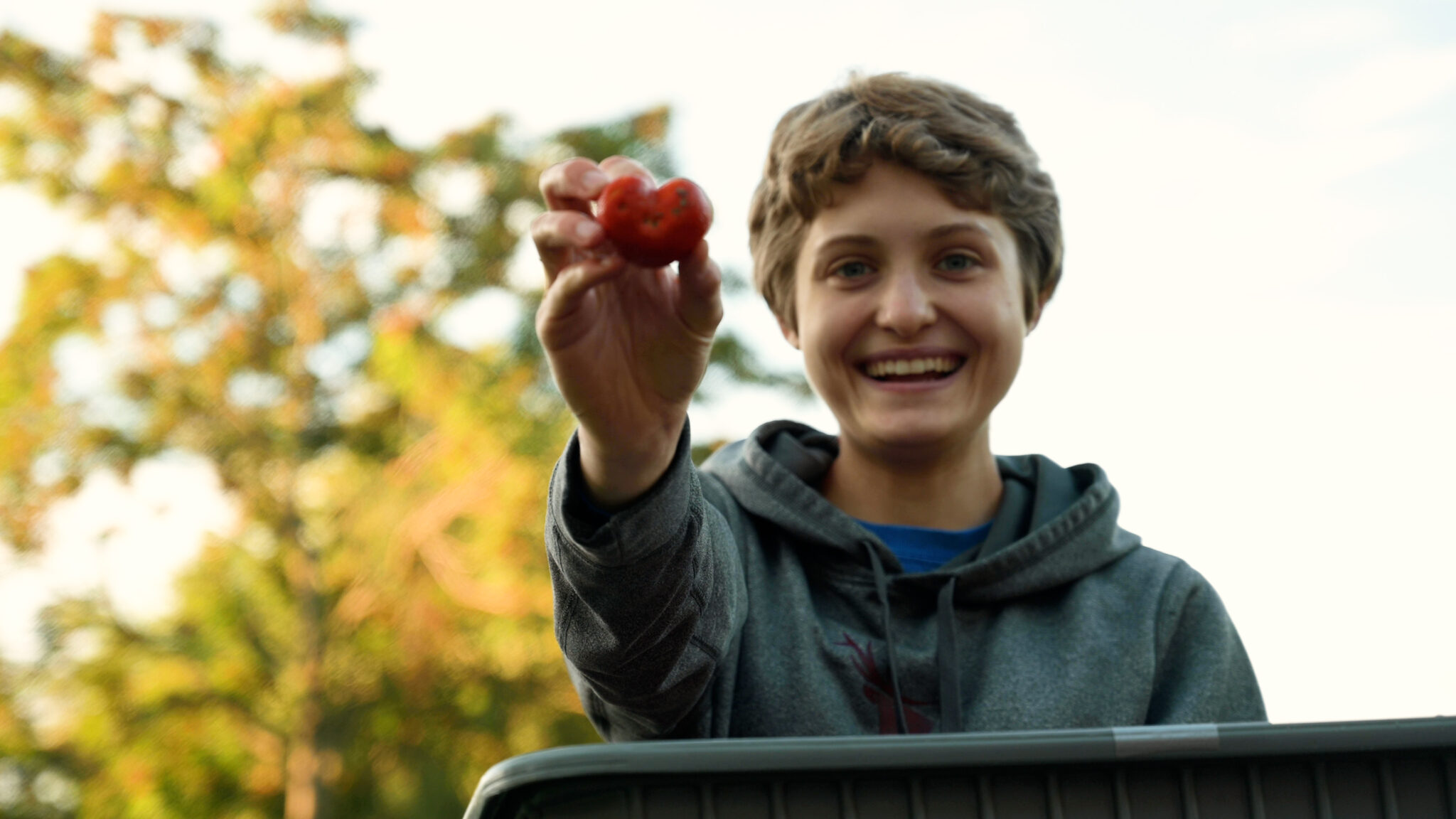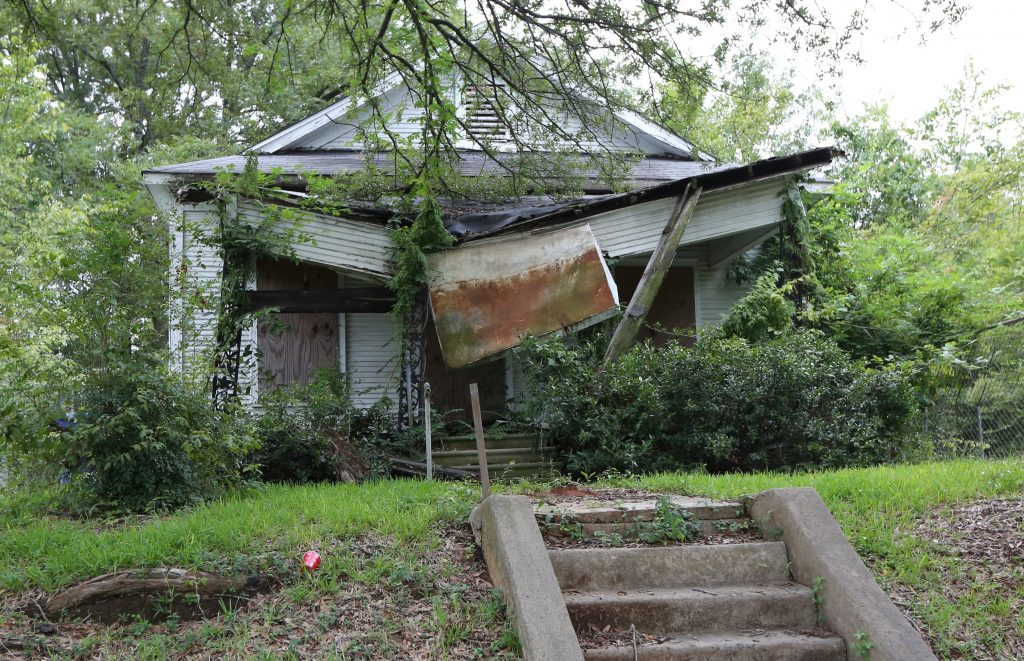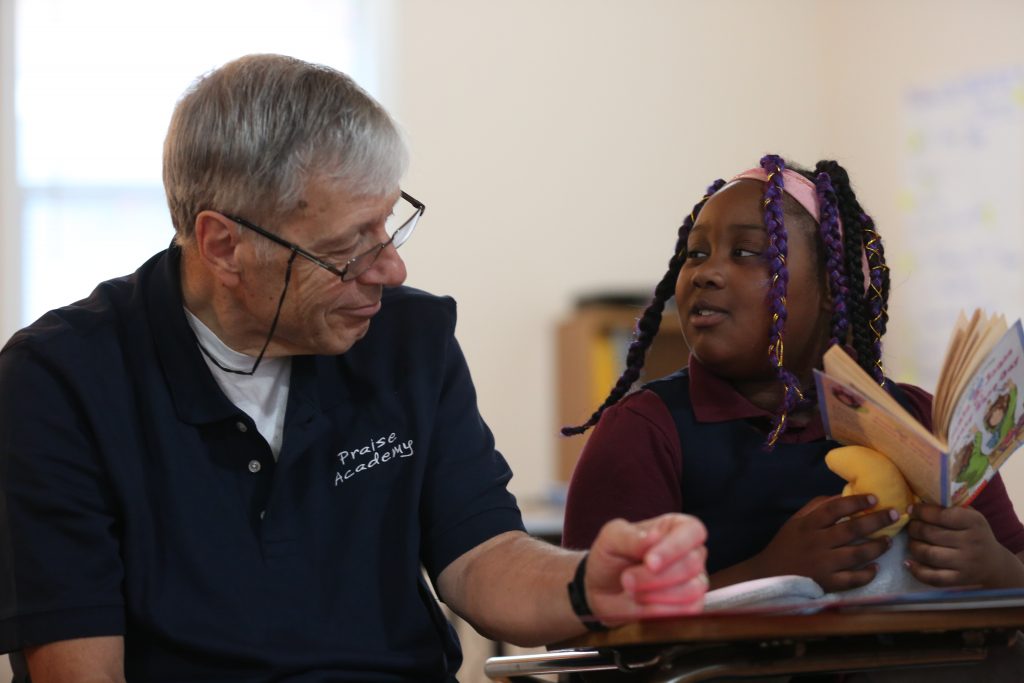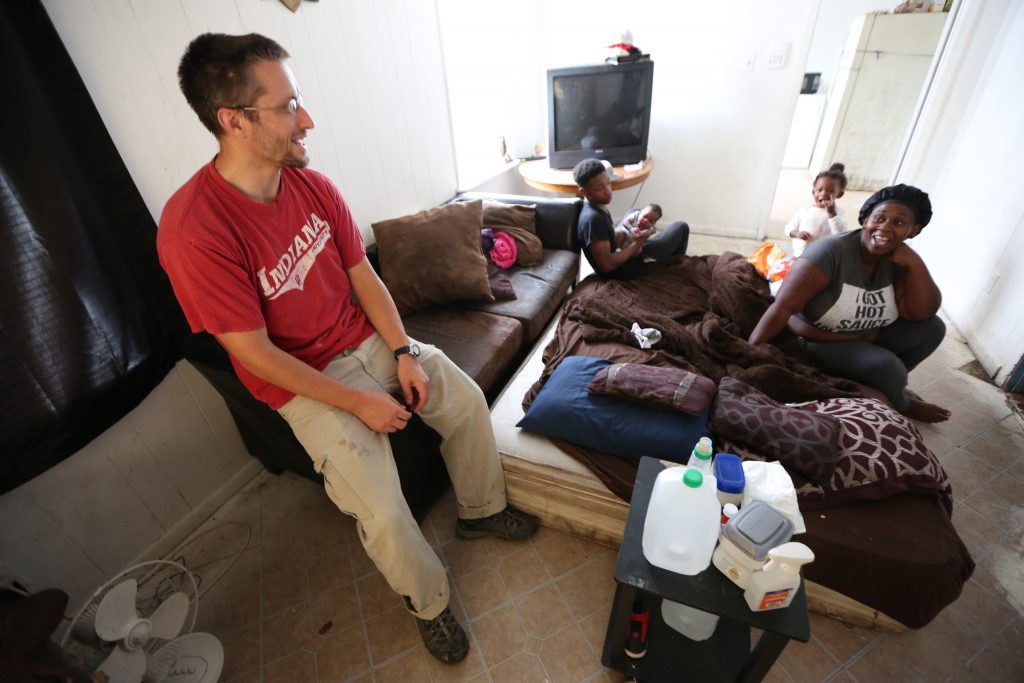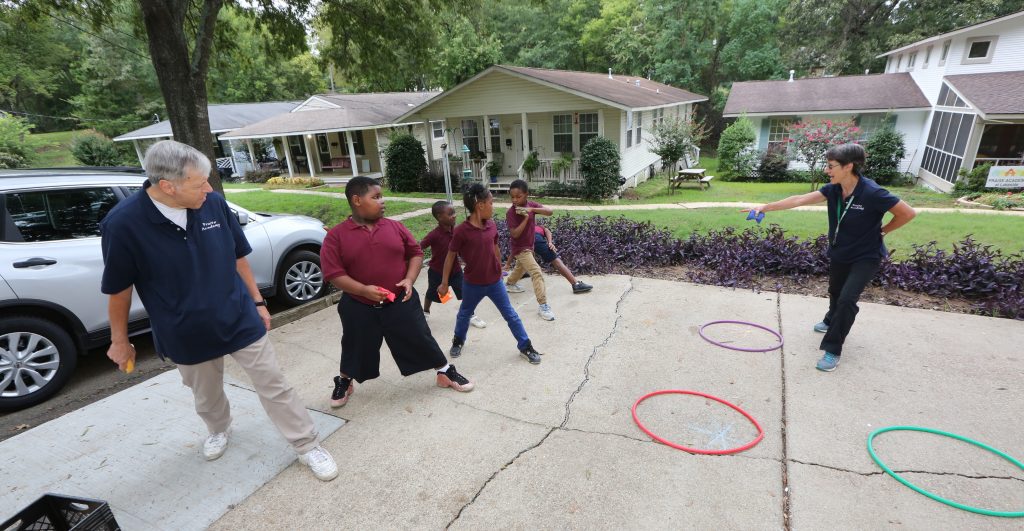 John and Jo Zimmel work hard at making academics and recreation fun for the children at Praise Academy. Photo by Dave Hrbacek for The Catholic Spirit.
John and Jo Zimmel work hard at making academics and recreation fun for the children at Praise Academy. Photo by Dave Hrbacek for The Catholic Spirit.by Dave Hrbacek
Editor’s note: This article was originally published in The Catholic Spirit, the publication of the Catholic Archdiocese of St. Paul and Minneapolis. It is used by permission and has been edited for length.
“Miss Joan, my daddy’s in jail. They came and picked him up this morning.”
A child delivered this news to his principal, Joan Pingel, at a small school in Shreveport, Louisiana, before the beginning of the school day.
Her job for that day became figuring out how to help the student and his three other siblings at the school navigate their trauma, while trying to focus on the basics of reading, writing and arithmetic.
That particular event happened about two years ago, but that kind of occurrence is common in the Lakeside neighborhood of this low-income city, population 194,000. Lakeside lies within the poorest ZIP Code in the state, where torrential downpours throughout the year pound homes to the point of collapse, yet many people, including the school’s families, don’t have running water.
Such squalor is why Joan, 52, lives in Shreveport, not just to run the school, Praise Academy at Lakeside, but to live two houses down from it. Joan, a lifelong educator, moved in 2004 from South Bend, Indiana, to serve the poor in the Lakeside neighborhood and then took the principal job when the Christian school opened in 2015.
The owners of the house where she lives are John and Jo Zimmel from St. Paul, who decided to use their retirement years to, as they put it, “serve the Lord.” They moved to Shreveport a year ago, and they have committed their lives to volunteering at the school and in the surrounding neighborhood, which is plagued by violent crime, prostitution and drugs. Jo, 64, is a retired physical education teacher, John, also 64, is a retired chemist. They wear many hats in the course of a school day, which begins with breakfast at 8 a.m. and ends at 3:15 p.m.
Family reunion
The Zimmels’ arrival in Shreveport last October was a reunion of sorts. They joined two of their four adult children, David Zimmel and Jeanette Duddy, who already were living there and serving the neighborhood as part of the People of Praise, to which all four belong.
All of the Zimmels knew what they were getting into when they chose to live in Shreveport. They accepted the poverty and hardships of inner-city life, wanting simply to make a difference. They feel they can best do that by living and serving in the midst of people they know are in need of God’s love—and their help.
“To me, that’s connected with what Pope Francis is saying,” said David, 35, a leader of a division of the People of Praise called Christians in Mission, which serves in Shreveport and several other low-income neighborhoods in the United States. “The poor are a holy people. We talk in America so much about fixing the poor and fighting poverty. [But] there is a thing that’s called ‘holy poverty.’ And, while we need to really help people who are destitute and do good acts of mercy, our goal is not riches. Our goal is being with Christ. The people that I’ve met in this neighborhood have something that I would never want them to lose—a real genuine faith, the Spirit of God.”
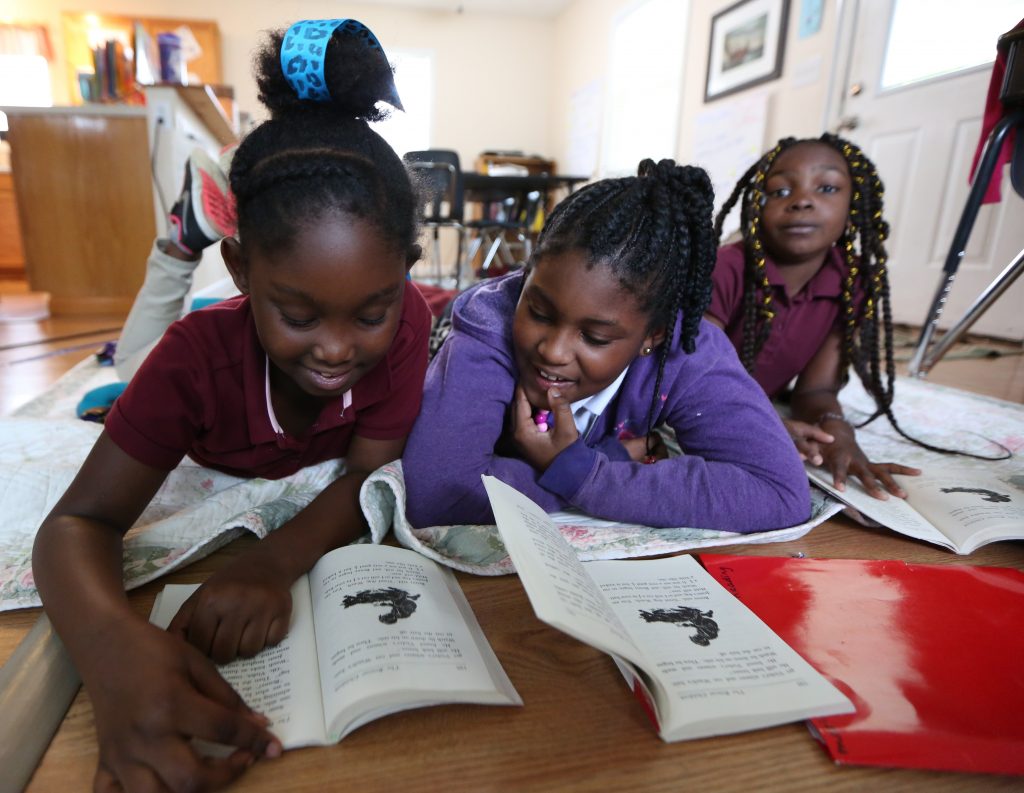 Three of the older students enjoy their daily reading time. Photo by Dave Hrbacek for The Catholic Spirit.
Three of the older students enjoy their daily reading time. Photo by Dave Hrbacek for The Catholic Spirit.What their neighbors wanted
That’s what he discovered when he went door-to-door several years ago to ask the people what kind of help they wanted from the missionaries. It was already obvious they needed economic assistance. Dilapidated houses dotting the neighborhood—some on the verge of collapse, with gaping holes in their roofs and crooked foundations—were clear signs of the perpetual poverty plaguing the people in this mostly African-American district of Shreveport.
When the People of Praise started offering a four-week summer children’s Bible camp in 2003, neighborhood parents and guardians responded enthusiastically. More and more children came each year, and now the camp draws as many as 150 participants each summer.
Seeing this, the missionaries decided to focus their outreach efforts on children. But, instead of relying on their own ideas, they queried people in the neighborhood. David was part of a team that hit the streets to visit residents.
“We went out and talked to every single person within two blocks of our homes with an open-ended question: What does God want us to do?,” he said. “As I talked to more and more people, I was surprised that it wasn’t just one person with one idea. It was the whole neighborhood with one idea. It’s like everybody had the same idea, which was a neighborhood school—in the neighborhood, for the neighborhood—where kids would learn how to pray, they’d learn how to read. Every child would be taken care of, it would be a safe place.”
In the middle of a block with seven People of Praise houses, they turned the largest home into a school. It opened with eight children. There are now 25, all African-American. The adjacent home has been turned into a second school building.
Tuition is $7,000 a year per student, with families paying what they can afford under the school’s “fair share” tuition policy. Some pay as little as $5 a month, some pay nothing. None pays anything close to full tuition. It costs $325,000 per year to run the school, which includes modest salaries for the staff. All of the funds come from private donations. Overall neighborhood outreach is supported by the People of Praise Mission Fund.
Educating children who are economically, socially and educationally disadvantaged is hard work, sometimes exhausting, staff members say. During nearly every classroom session, someone is misbehaving. Arguments and fights are common. Near the end of a school day in September, Jo proudly proclaimed that she did not have to break up a single fight in her three physical education classes.
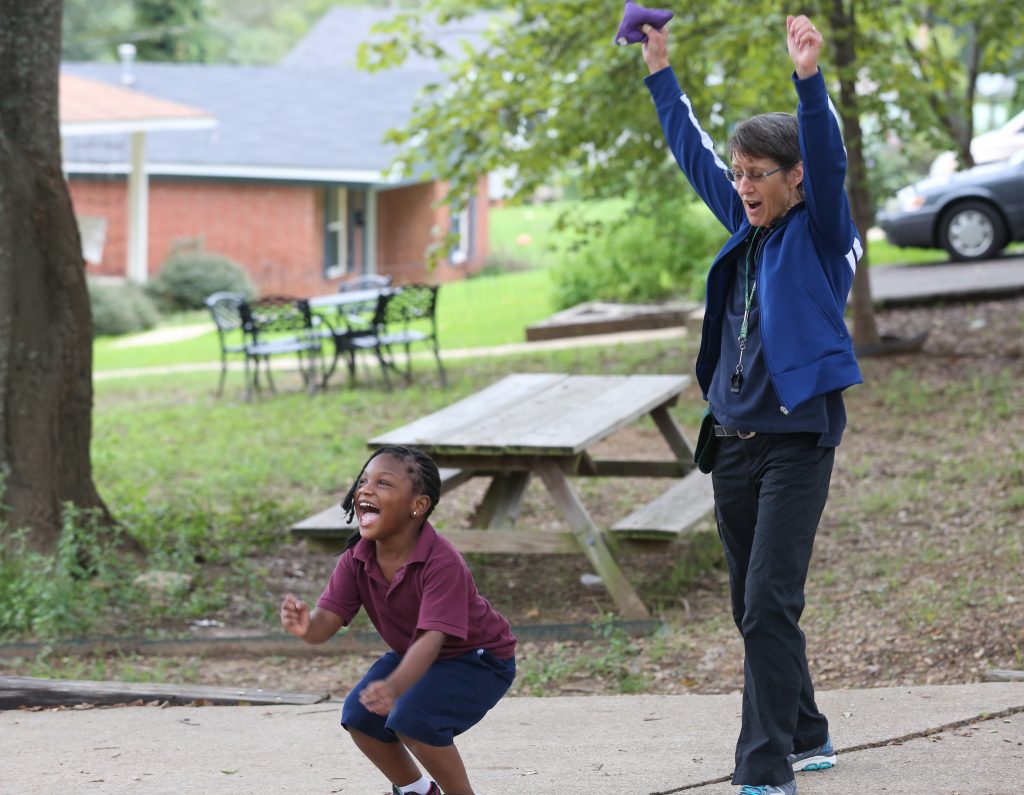 Jo Zimmel rejoices with a kindergartner over a successful beanbag throw. Photo by Dave Hrbacek for The Catholic Spirit.
Jo Zimmel rejoices with a kindergartner over a successful beanbag throw. Photo by Dave Hrbacek for The Catholic Spirit.Enjoying modest gains
Small victories like this are celebrated. Any progress, no matter how small, fuels the drive she and her husband have to work with these children.
“When they have a success, you’re super-excited,” John said. It can be as simple as the time he was working with a student who finally learned that six plus three equals nine. Instead of counting it on her fingers, the student calculated it in her head. When she blurted out the answer twice in a row, her joy became his.
It spreads to the parents, too, who notice what the school does for their children. Shameka Blair is a 27-year-old single mother of nine who lives in a small home a few blocks from the school. Four of her children, ages 4 to 9, attend Praise Academy, and David often drives them home when classes are done for the day.
“I like this school,” Blair said. Her children “are doing great since they’ve been there. When they first went there, they didn’t know how to spell their names. Now, they know how to spell their names.”
At first, Blair didn’t trust the white people who moved into her neighborhood, David explained. All of the People of Praise members who live there now are white, and he said there is a general distrust of white people in Lakeside among the neighborhood’s African-American majority. But she warmed up to the missionaries over time. After many interactions, she now says, with palpable warmth in her voice, that she “loves them people.”
And they love her. Joan has become a go-to for Blair whenever a need arises, even driving Blair to the hospital to deliver three of her babies, including Zechariah, who was born Labor Day weekend.
“They have helped me out a lot,” said Blair, who first met them at neighborhood barbecues hosted by the People of Praise. “Especially Mr. David and Miss Joan. Out of everybody, I know them the best. They’ve been good to me and my family. . . . They do a good job, and they come down and they show love.”
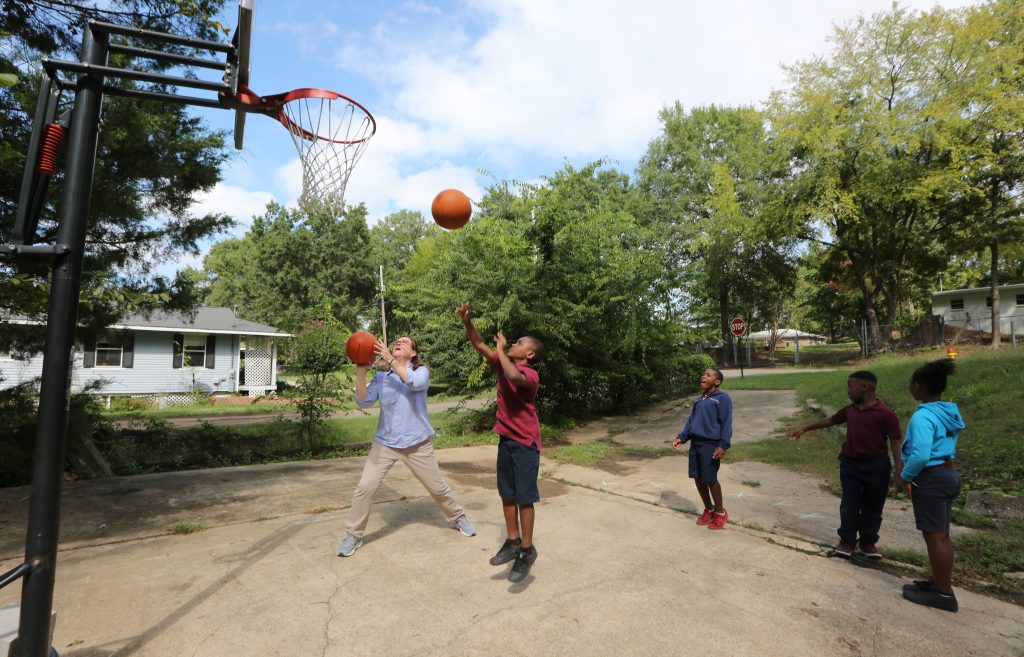 Joan Pingel (left) plays challenge ball with students during recess. Photo by Dave Hrbacek for The Catholic Spirit.
Joan Pingel (left) plays challenge ball with students during recess. Photo by Dave Hrbacek for The Catholic Spirit.Spreading love and help 24/7
For Joan and others at the school, which has six full-time teachers plus regular volunteers like the Zimmels, their work in the school and community is not so much a job as it is a lifestyle. It’s a calling that is lived out from dawn to dusk, no matter the need.
That’s evident when the weather gets cold during the winter months and the above-ground pipes of many houses freeze. Joan has learned to call around when this happens to ask if people have running water. If they say no and need to do laundry, her reply is always the same: “Come on over.”
There are other times when families have run out of food, and Joan and others have gone to the store and brought several bags filled with groceries back to their houses. One time, she went into the house with one of the children because there were other adults, not family members, in the house, and she feared they might hijack the food. After walking into the living room, she sat down on the floor with the children while they ate.
This act, meant to provide security for the children, symbolizes something deeper. As much as the People of Praise members want to help neighborhood residents, they also want to get to know them. It means spending time under each others’ roofs. That is why Joan and the Zimmels often invite families over for dinner.
Overall, they want to live a common life and bring the people of Lakeside into it. David feels the addition of his parents has helped this process along.
“Like family”
“We treat each other like family here,” he said. “It’s like one big community that’s all one big family. And the fact that some of us are actually family has made it a lot easier to explain what it is we’re doing.”
One current Praise Academy parent was a teenager when the People of Praise arrived in Lakeside. Lacondra Woodson, 28, had just lost her best friend to cancer when the first People of Praise families moved in just a few doors down from her family’s home. She opened up and shared her grief with her new neighbors, and a bond was formed. She now is married with three children, all of whom attend Praise Academy.
Woodson made a big sacrifice to live near the school, as she works two hours away. She drops off her kids at a friend’s house at 4 a.m. before leaving for work so that she can get there at 6 a.m. She has no complaints about spending four hours on the road every day.
“It’s a school, but it’s more like home to my kids because we kind of grew up around here,” she said. “Just seeing the smile on my kids’ faces when they get home . . . makes me happy. I want the best for my children, and I feel that they have the best [at Praise Academy]. I don’t want to take them out of [the school].”
One of the school’s foundational principles is one-on-one time with students. It starts with a half-hour of reading with each student every morning. Teachers and volunteers sit down one-on-one with students, and listen to them read aloud.
Students receive more individual attention throughout the day, especially when there are disciplinary issues. Teachers or volunteers will pull a struggling student aside to talk through problems and conflicts. Often, the discussion centers on teaching students nonviolent ways to resolve conflicts with other students. It’s challenging because this method is not taught or modeled in most of the homes, Joan said. She said she has had to tell some parents that “we don’t fight; we’re not a fighting school. . . . That’s not what we do.”
The students’ academic success is coming in small increments, enough for staffers to get excited about the future of the school’s graduates. In a neighborhood where some children never get beyond the third-grade level and end up incarcerated, Praise Academy students can dream of graduating from high school and even going to college.
The school’s lone eighth-grader has declared she wants to go to medical school and become a surgeon. A Praise Academy board member—who spent several decades as an instructor in a college nursing program—has made time to talk with her about the medical field. At the moment, there is discussion about trying to raise money so the girl can attend a private high school. Potential donors have shown interest, and Joan is optimistic about getting tuition help for the student.
Here to stay
Regardless of the outcome for this student and the other 24, the People of Praise members in Lakeside are there for the long haul. John and Jo have no other retirement plans; they merely say they will reevaluate in a few years. Even if they ever felt like leaving, they might have a hard time convincing Joan to let them go. She wanted them to come even before they had made the decision.
“When they had decided that when they retired they wanted to look into whether they’d like to move into the missionary field, I started praying that they would come to Lakeside,” she said. “And when they said they had discerned that this was where they were going to go, and they were invited to come, I said, ‘Wow.’ This huge relief came over me . . . because I know they have a lot of gifts that they could offer.”
The list of the ways they serve continues to get longer. John has become a handyman and also has developed teaching skills, as he dutifully helps Jo in her physical education classes and spends a half-hour every school morning reading with students.
It’s all part of doing whatever they can to advance the kingdom of God in a poverty-stricken area that can seem forgotten by not only the State of Louisiana but even the rest of Shreveport itself. David Zimmel explained how, decades ago, a freeway was built in Shreveport that essentially cut off this part of the city. At one time, the area was home to a robust Jewish community. One of the few signs of that past life is a Jewish cemetery across the street from Praise Academy.
Poor residents here continually ask the city and state for help, but it’s slow in coming, David said. Some local churches, including a Catholic parish, have offered assistance, while others are reluctant to come into the neighborhood.
“I really believe these are God’s people,” Jo said. “My job isn’t much different than Jesus’, which is to keep on loving them. When I get up in the morning, I pray for the love of the Lord to keep on keeping on. It’s not my strength, it’s not my feeling, it’s my love for the Lord, that he’s called me to serve these people at this time. And I’ll give it my best shot, with his grace.”
This legacy is stretching into the third generation for the Zimmel family, as their daughter Jeanette, 33, and her husband, Thomas Duddy, are raising their two children in the Lakeside neighborhood. Like all of the other People of Praise adults—and even some children—the Duddys put in regular volunteer hours at the school, cleaning and helping wherever needed.
“It’s a real privilege to get to live with the poor,” Jeanette said. “Jesus said, ‘Blessed are the poor.’. So I feel really blessed to get to live here and be part of our work, living next door to people who really need a lot of help, need the Lord.”
Already, Jeanette has seen racial barriers start to fall, with some of the neighborhood children keeping pictures of her daughter, prompting their friends to ask: “Do you have a white sister?”
“I think we’re forming those kinds of relationships with our neighbors,” she said. “But it’s taken a while, and the opposition is real. There’s been really horrible things that have happened in our [American] history, which makes it hard to earn trust and to be friends together. But, when you live with people, that makes a big difference. If we didn’t live here, it would be totally different.”

